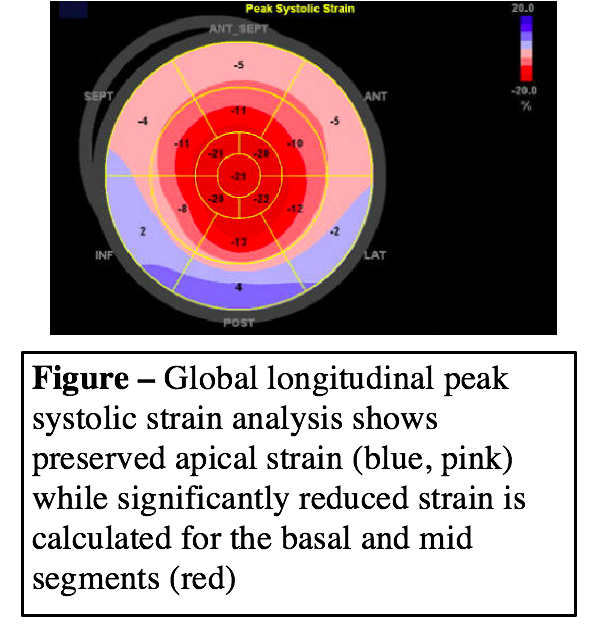Case Presentation: A 27-year-old female with a history of PTSD, anxiety, and tobacco use initially presented to the emergency department with the worst headache of her life. Labs were significant for white blood cell count of 18.8 (normal 4.3 – 10.8 x 109 cells/L), troponin of 2.91 (<0.04 ng/ml). EKG showed 1mm ST depression in V4, but no ST elevation. Urine drug screen was positive for amphetamine derivatives. The patient had taken Adderall prior to her headache, which she normally does not take. Brain MRI showed right frontal subarachnoid hematoma. Cerebral angiogram showed patent carotids and vertebral arteries. Transthoracic echocardiography (TTE) showed moderately decreased left ventricular fraction of 30-35%, with only the apex of the left ventricle contracting, and the base of the left ventricle akinetic as in a Reverse Takotsubo variant pathology. MRI with cardiac protocol (non-stress) several days later which showed no abnormal enhancement of the myocardium, no infarct, no evidence of myocarditis, and very minimal pericardial effusion. Importantly, there was also recovery of basal hypokinesis. TTE done just two days after the initial imaging showed recovery of ejection fraction to 45-50%.
Discussion: Reverse Takotsubo cardiomyopathy (TC) is much less common than its typical counterpart. Reverse or inverse TC occurs in younger patients and women, and does not have apical ballooning. The pathogenesis of this is thought that in younger patients, there are more adrenoreceptors at the base of the heart; catecholamine spikes then lead to coronary vasospasm in these areas. In this case, a transient systolic dysfunction of the base of the left side of the heart mimicked myocardial infarction, but fortunately recovered after resolution of the acute stressor. Here, it is an unusual subarachnoid hemorrhage that was triggered by inappropriate Adderall (amphetamine, dextroamphetamine mixed salt) usage.
Conclusions: Reverse TC is associated with younger patients and hypercatecholaminemia that is seen in pheochromocytomas, paragangliomas, and subarachnoid hemorrhages. There are case reports in the literature that have detailed caffeine, energy drinks, as triggers. However, this is the first such notice of Adderall, albeit indirect, as an inducer of reverse variant TC.

